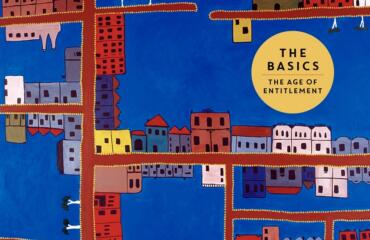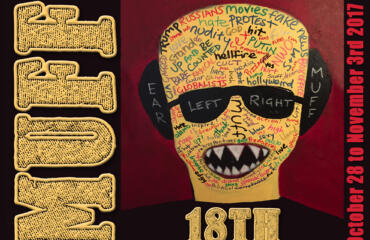Here’s something that Vin Diesel has said about his character in Guardians of the Galaxy Volume Two:
“Groot is such a fascinating character on so many levels.”
Here’s something that Vin Diesel has said about the process of voicing his character:
“It’s very, very challenging.”
Groot is a talking tree stump whose vocabulary is limited to precisely three words, “I am Groot”.
He’s also the second-best thing in the very long, very-weird-when-you-stop-and-think-about-it-for-more-than-five-seconds Guardians of the Galaxy: Volume 2, the latest entry in the thoroughly crowded Marvel Cinematic Universe.
The sequel to the 2014 blockbuster, volume two follows the adventures of Peter Quill (Chris Pratt) and a merry band of oddball aliens, including the aforementioned Groot, a talking racoon named Rocket (voiced by Bradley Cooper), a green humanoid called Gamora (Zoe Saldana) and the hulking Drax (Dave Bautista).

This time around, the gang are accompanied by Gamora’s sister (played with charismatic intensity by Karen Gillan) and Quill’s estranged father, Ego, played by Kurt Russell, who is nice to see if kind of forgettable. They are pursued by a race of highly conceited gold humanoids known as The Sovereign, led by Ayesha (Australian actor Elizabeth Debicki).
Both Debicki’s character and performance are the highlight of proceedings. The film wrings genuine laugh-out-loud humour from The Sovereign’s comically misplaced arrogance. Debicki’s energy, almost entirely pulsating from her eyes, goes some of the way towards mitigating the film’s many other lulls.

Note to Marvel: if you want to make yet another spin-off TV series for an obscure American cable network, you could do worse than to centre it around The Sovereign and Debicki.
The film’s many other lulls run the full gamut from boring to deepy disquieting.
Guardians 2 opens not in the far reaches of space but on a road in Missouri. A young man and woman are driving in a convertible, blasting out music. Eventually, the camera zooms in and onto the car’s occupants and we realise that the man is an uncanny reflection of Kurt Russell, CGI’ed to look 30 years younger.
Digitally altering the faces of actors is becoming something of a deeply misguided trend in Hollywood. Last year’s Star Wars movie, Rogue One, controversially employed the technique to resurrect 1970s Carrie Fisher.

The problem is not just that the technology isn’t quite there yet. Even if it had evolved to the point of true photorealism, it would still be doomed to fail because there is a single irrefutable truth that is common to all of our lives: time passes.
We know, on every conscious and unconscious level, that Kurt Russell is not in his twenties any more, that he hasn’t been for decades. Resurrecting him in CGI form just briefly reminds us that time is irreversible and we’re all dying.
After unwittingly provoking existential despair in its opening scene, the film moves on to some rather tired banter between its main characters. Argument + adventure is the successful formula propelling countless franchises, and although the adventure side is for the most part successfully executed here, it takes a long time for the dialogue to sizzle.
“I was cybernetically engineered to pilot this ship,” Rocket says in an argument over who should pilot it.
“You were cybernetically engineered to be a douchebag,” comes the reply.
It’s not exactly the height of wit.
The script is overflowing with these sorts of moments, and infuriatingly patronises its audience by making its characters respond emotionally to what is happening, as if to say hey this is how you should be responding, too.
Note to Marvel: if you want to make yet another spin-off TV series for an obscure American cable network, you could do worse than to centre it around The Sovereign and Debicki.
I lost count of how many times something vaguely funny would happen and then Drax would laugh hysterically and at length. Even the final shot falls victim to this tendency, serving as an entirely superfluous underlining of an already overwrought emotional register.
Thankfully, the visual design of Guardians goes some way towards, if not redeeming it, then certainly making it interesting. One character commands a floating arrow through whistling. The arrow has a distinctive red tail, and a key sequence shows him wreaking carnage by driving the arrow through the hearts of a vast array of people in slow motion.
The scale of violence on display is almost unfathomable, but it’s very beautiful to look at.
In the end, Guardians of the Galaxies 2 struggles with a sensibility that tries to have it both ways. At certain points the film deliberately undercuts its own sincerity, winking at the audience to let us know that we’re in on the joke. A slow-motion pan around the various characters in the middle of a battle abruptly stops when debris falls on top of one of them. It’s just another example of the film’s patronising tendency; it tentatively reaches for a truly cinematic moment but doesn’t follow through, instead laughing at itself, and seemingly us, for having a go.
Of course, not every attempt at sincerity is undercut. When Peter Quill returns to his father’s home planet, his dad shows him how to create a little ball of energy out of thin air. The two then begin to throw the ball back and forth, in a way that mimics the throwing and receiving of a baseball.

Yes, Quill’s finally been given the chance, denied him in childhood, to engage in that quintessential American pastime of throwing a baseball with your Dad. I expected the film to interject, to find some way of rolling its eyes at this cliché, and yet the scene is played straight. It’s the very definition of sentimentality as unearned emotion.
Later, Cat Stevens’ Father & Son makes a later appearance on the soundtrack.
So we end up with a movie that wants to have its cake and eat it too. Some clichés are acceptable – father/son bonding, the genius of seventies singer/songwriters; others must be undercut for laughs – sincere deployment of cinematic technique; the expectations of genre.
The most enjoyable part of Guardians of the Galaxy: Volume Two is genuinely found in its end credits. A specially-written song featuring David Hasselhoff pulsates through footage of characters and actors dancing without a trace of self-consciousness.
The end credits offer an extended moment of effortless and uncomplicated fun. The bulk of the preceding 133 minutes works far harder for far less enjoyment.
► 2 stars



